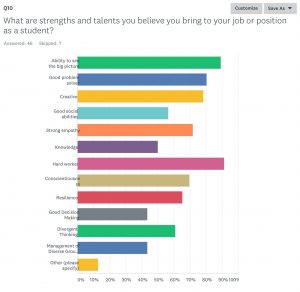If you haven’t filled out our DYSLEXIA AT WORK SURVEY – there’s still time! Click HERE.
What’s the #1 strength that people report at work?…. Big picture strengths!

A wide range of occupations were reported. Here are some examples: program coordinator, physician, factory worker / full time student, planner, analyst, special education teacher, occupational therapy, manufacturing tech, finance and HR controller, attorney, carpenter, software engineer, high school administrator, digital marketer, manicurist, human resources, vice president sales, entrepreneur, Principal, COO, non-profit executive, animatronics, cybersecurity, regional manager, tutor, community health nurse, information architect, counselor, artist, underwriter.
60% of respondents said that they have disclosed their dyslexia at work. About 25% disclosed to a supervisor and 30% to a co-worker or friend. Only 6% disclosed to human resources and 40% chose not to disclose. Although a majority of people felt that their general situation at work improved after disclosure, 40% said it got worse. Clearly this situation needs to improve.
Pressing needs included: lack of alternative formats for text (like text to speech, 47%), lack of supports for proofreading, and reduced need to record information by hand.
On the Job

Sources of job discrimination included openly critical supervisors or co-workers who lacked any understanding about dyslexia and made negative comments, performance evaluations that involved timed tests without accommodations, denial of promotion due to tasks related to dyslexia and work situations that failed to accommodate.
Positive work environments included those where dyslexia could be mentioned openly (and where other employees were known to be dyslexic) and supervisors who were supportive and help change policies or environments.
Some respondents share how they came up with their own workplace supports like making a template for all their reports and having a co-worker or secretary proofread. Many prefer talking to people in person rather than writing long emails, and many recommended enabling text to speech as well as another who suggested adding text to speech in commands in Word and Outlook.
What was the most popular suggestion for making a better workplace for dyslexic people? Promoting POSITIVE Dyslexia Awareness!














